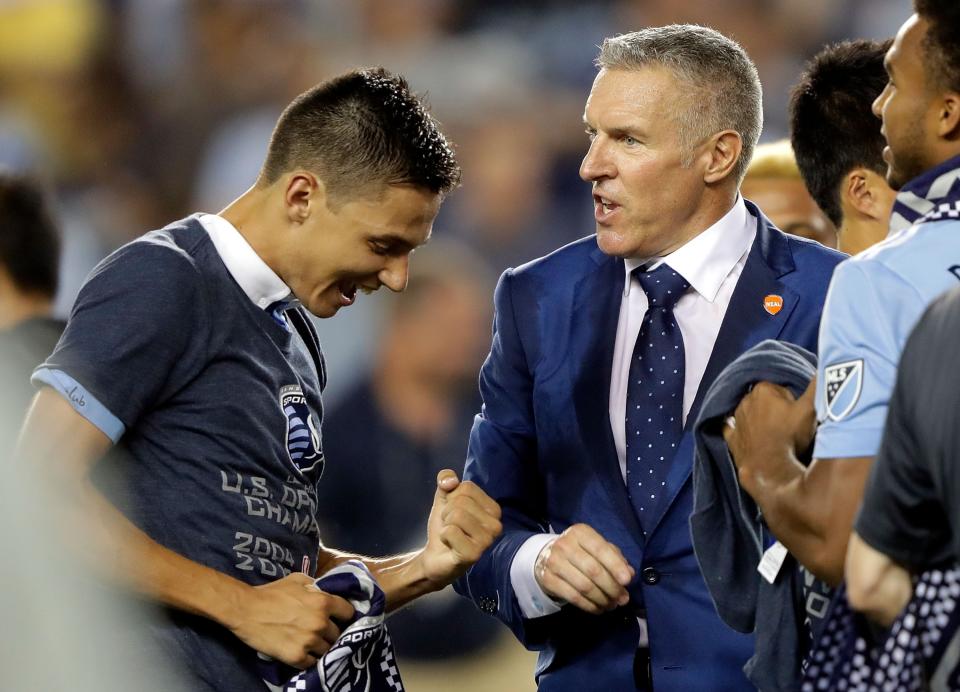Major League Soccer coach Peter Vermes: MLS is 'on the precipice of something great'
Major League Soccer has been around since 1996, but after two decades, its popularity is seeing hockey-stick growth.
Average MLS game attendance was 22,106 in 2017, third behind the NFL and MLB. (Yes, higher than the NBA.) Expansion team Atlanta United FC, in its first season of existence, had the highest average attendance (52,409) of any U.S. sports team other than NFL teams.
The league began with 10 clubs and is now up to 23; it will have 26 by 2020 after it adds teams in Cincinnati, Miami, and Nashville. (Former Daily News sports columnist Filip Bondy, writing at Forbes, says the MLS might even be “growing too rapidly for its own good.”)
It’s easy to see why Adidas re-upped its MLS sponsorship for another six years at a price tag of $700 million.
If you ask Sporting Kansas City head coach Peter Vermes, a former member of the US Men’s National Team, the growth starts with the gameplay on the field.
“At end of the day, it comes down to entertainment, and the product has gotten better on the field,” he told Yahoo Finance in a live show appearance just before the 2018 World Cup Final. “Over the next six or seven years, we’re probably going to get to 30 teams. And with that growth, sponsors come. And then our TV contract is coming up in a year or two, and I think that’s another aspect that’s going to grow. I think we’re on the precipice of something great.”
But MLS also owes a lot to two off-the-field factors that Vermes cites.

Merchandise and savvy branding
The MLS team in Kansas City was called the Wizards, until it rebranded in 2010. Vermes, who has coached the team since 2009, recalls, “There were people that thought it was going to be the worst decision ever.” At that time, the Wizards were dead-last in the league for merchandise sales, even behind All-Star Game gear and generic MLS gear.
But after the team got a new name (Sporting Kansas City) and a new arena (now called Children’s Mercy Park) it shot up to No. 1 for merchandise sales the next season. The story is commonly cited as an example of a hugely successful rebrand.
Many other MLS teams have rebranded over the years, like the Dallas Burn becoming FC Dallas and the San Jose Clash becoming the Earthquakes. In 2014, MLS did an official rebrand at the league level, changing its logo to a more European style crest. It’s all part of an obvious effort to make MLS teams look and feel more like top-tier international clubs, and it has worked.
To be sure, the US Men’s National Team missing the 2018 World Cup was an embarrassing failure for American soccer, one that caused negative business effects. As Vermes acknowledges, “Obviously it has a negative impact no matter what, in so many respects. We missed the boat… Our objective has to be more than just qualifying for the World Cup, we need to win a World Cup.”
But the burden to improve America’s national team is mostly on the U.S. Soccer Federation, says Vermes: “It’s not the responsibility of MLS.”
The David Beckham effect
Vermes says that MLS Commissioner Don Garber has “been very specific and particular about who are the ownership groups that he brings in.”
One key example is with the Miami MLS franchise, as yet unnamed, set to begin playing in 2020. The ownership group, Miami Beckham United, is led by international star David Beckham, who played in MLS for the LA Galaxy from 2007 to 2012. There are other big business names in the ownership group, including former Sprint CEO Marcelo Claure and Softbank CEO Masayoshi Son, but none compares to the star power of Beckham.
“It was a master stroke in bringing him to the league,” Vermes raves. “He is tremendous for the league itself. His popularity is going to lend itself to that city, but more importantly, that ownership group. I think you’re going to be amazed at the players that they bring in from overseas. I would not be surprised if you saw a Ronaldo or a Messi one day playing in Miami. The two of those guys, I bet you, at some point may be playing together in Miami, which they could never have done in Spain.”
Of course, international stars have always come to MLS to play out the twilight of their careers. Wayne Rooney just signed on with DC United, Steven Gerrard played for the LA Galaxy, Frank Lampard played for NYCFC, and David Villa still plays for NYCFC. But Beckham is taking it a step further, as an international star who played in MLS, then played a season in Ligue 1 for Paris Saint-Germain—and now returns to MLS as an owner.
Expect Beckham’s Miami MLS team to sell a lot of merchandise, backing up the argument Vermes makes about combining savvy branding with star power.
—
Daniel Roberts is the sports business writer at Yahoo Finance. Follow him on Twitter at @readDanwrite.
Read more:
MLS commissioner on potential Columbus Crew relocation: ‘These things are traumatic’
World Cup ratings bouncing back after big drop in first round
MLS smashed attendance records in 2017
Adidas extends MLS sponsorship for six years, $700 million
MLS commissioner on sports gambling: ‘I don’t think we can stop it’
